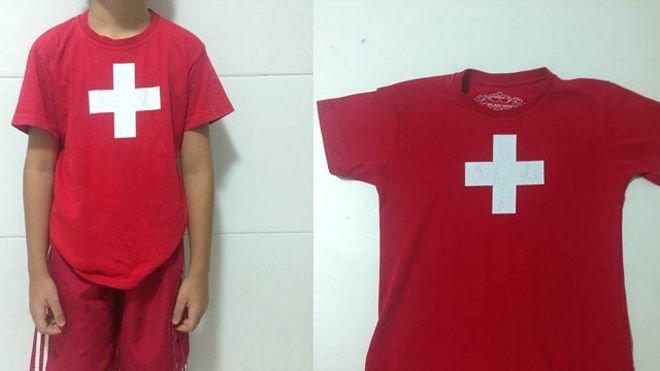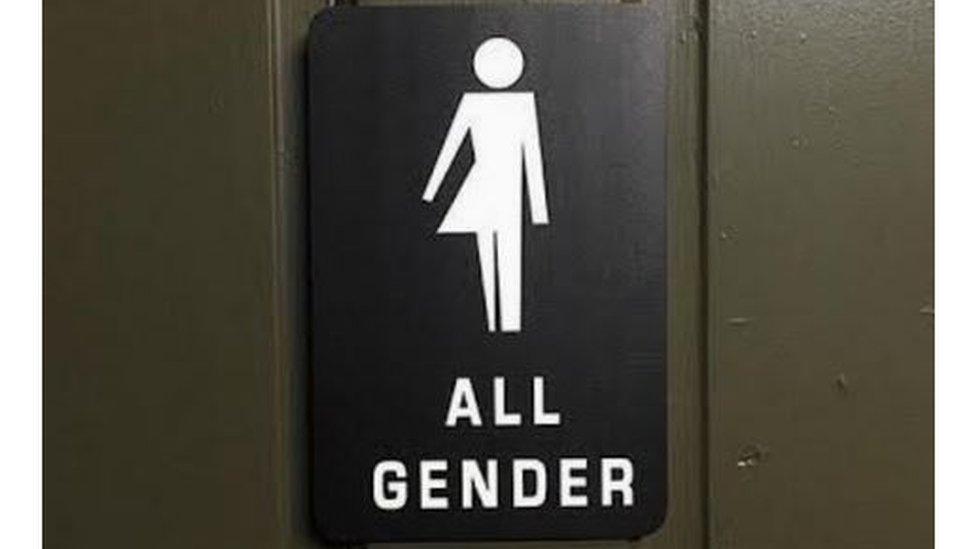Threats and violence: Brazil's political troubles play out online
- Published

Rogerio Maudonnet's son was targeted for wearing a shirt bearing the Swiss flag - classmates mistakenly thought it represented the Workers' Party
Be careful what colour you wear in Brazil these days.
When a 9-year-old boy from Sao Paulo wore a shirt with a Swiss flag on it to school, he was shouted at and threatened by his classmates. The red of the Swiss flag, they claimed, marked him out as a backer of the scandal-hit government of President Dilma Rousseff.
"They called him a supporter of the Workers' Party and said he should be beaten and thrown in the streets," the boy's father, Rogerio Maudonnet, told BBC Brasil. "I was very scared to see children repeating hate speech."
Maudonnet posted his story on Facebook, external. But his story is not an isolated one. As clashes mount between pro- and anti-government supporters, hundreds of Brazilians are taking to social media to speak out about episodes of harassment, verbal abuse and violence by supporters from all sides of the political spectrum.
Many say they have become targets for the most trivial of reasons - even without overtly expressing their political preferences. Some have no strong political leanings at all. And sometimes the incidents happen in very unlikely circumstances.
Renata Baltar, a 28-year-old historian also from Sao Paulo, said a man accosted her while she was out one evening. Baltar shared the story on her Facebook page, external.
"I was with an American friend and we decided to have a snack at a local restaurant after a party. It was around 5 a.m. and the place was crowded. All of a sudden the whole restaurant started to shout anti-government chants," she recalls.
"Then a man who was sitting beside me started to make some really derogatory, sexist comments against President Dilma Rousseff. I said to him she could be a bad president, but he had no right to offend a woman like that."
"He turned to me furiously and called me names. He offended me with the worst possible comments, saying he would punch my face and I should be beaten," she told BBC Brasil.

Follow BBC Trending on Facebook
Join the conversation on this and other stories here, external.

The incidents aren't confined to supporters of the opposition. Brazilian TV comedian Leo Lins said he was beaten by a Workers' Party's supporter in a recent pro-government rally. Lins openly supports Rousseff's impeachment.
"I live very close to the place where the demonstration was taking place. On my way to the bakery I was beaten by a protester. It was an unjustified attack," he told BBC Brasil.
Soon after the incident, Lins recorded a video on the spot, which he later posted on social media, external. The images have been shared then hundreds of times on Twitter and Facebook.
"There are intolerable people and ignorant attitudes in both sides. I am not afraid but it makes me sad I won't be able to leave home whenever I want if there is another protest near my house."

Blog by Luis Barrucho and Ingrid Fagundez, BBC Brasil
Next story: Mapping safe toilets for transgender Americans

For most, the act of going to the bathroom is an unremarkable part of their daily routines. However, for transgender people, fear of harassment makes this small decision a tough obstacle. READ MORE
You can follow BBC Trending on Twitter @BBCtrending, external, and find us on Facebook, external. All our stories are at bbc.com/trending.